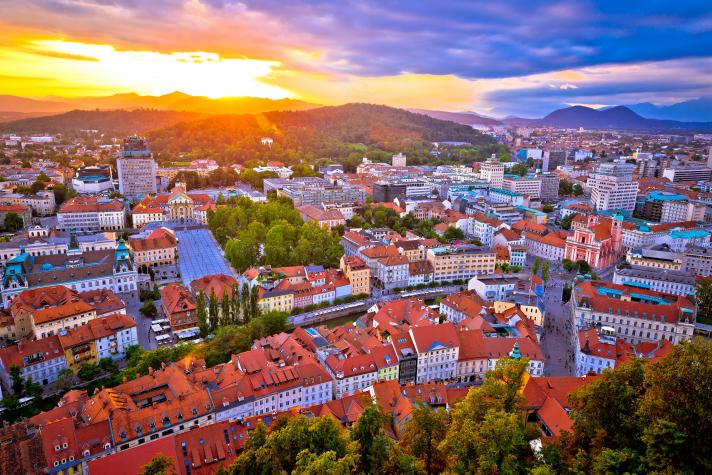Green capital in the heart of Europe
Ljubljana is Slovenia’s largest city with over 279,000 inhabitants and is one of the leading urban destinations in the field of smart tourism. The city offers an enchanting blend of the Mediterranean atmosphere, enticing gastronomy and diverse, year-round experiences, while being nestled in an Alpine environment. A pedestrian-friendly city with 542 m2of green area per capita, it has seen strong growth in the tourism sector during the period from 2014 to 2019. Average annual growth in the number of overnight stays was 14% and 13% for arrivals. By 2019, numbers had increased to 1.12 million arrivals and 2.27 million overnight stays. This means an increase in overnight stays of as much as 90% in just six years.
Enchanting and innovative city
The URBANA smart card or URBANA App can be used on public buses (for €1.30, users can make unlimited journeys within 90 minutes), for the bicycle-sharing system, as well as parking fees and cable-car rides to the Ljubljana Castle. Ljubljana currently has over 300km of bike lanes, which are constantly being improved. Six electric vehicles for the elderly and disabled have also been introduced in the city; these offer free rides around the city centre. An emission-free electric train enables disabled people to drive by attractions while listening to audio guides. There are also an increasing number of cash machines positioned at lower levels and many are equipped with braille for the visually impaired. The Ljubljana Wheelchair App gives advice on more than 130 wheelchair-accessible locations. Playgrounds for children with disabilities have been built and many of them also include training stations for the elderly. Guided tours, organized by Ljubljana Tourism, are available in 19 languages and the official website and its promotional leaflets are also multilingual. Water fountains can be located through the mobile app Tap Water Ljubljana. The opening of a VR/AR Lab at the Ljubljana Technology Park in March 2019 represents another milestone in the city’s smart development. The lab enables cooperation between businesses and different institutions for developing tools that will transform the roles of current digital platforms. The WiFree Ljubljana network makes sure that everyone has access to digital information with more than 400 access points located around Ljubljana and users are able to use the Wi-Fi free of charge for 60 minutes per day. Ljubljana has also been awarded the title of the City of Literature by UNESCO.
World Bee Day as Slovenians intended
Ljubljana is paving the way for all tourist destinations to adopt smart and innovative practices. One of the more particular aspects of their successes is the implementation of World Bee Day. Slovenia is the only EU Member State to have protected its native Carniolan bee, and successfully proposed to United Nations to declare the 20th of May a World Bee Day. Every year, the whole month of May is dedicated to the celebration with various events. In the framework of the European Green Capital activities, a Bee Path project was established to promote and sustain the Slovenian beekeeping tradition that dates to the first settlements. The project linked over 35 partners from the public and private sector in joint promotion of honey and the beekeeping tradition that is produced in Ljubljana where more than 4500 beehives are set by urban beekeepers. Bee Path tours were also designed to promote learning about beekeeping.

Virtual and Augmented Reality Tourism
The Ljubljana city council introduced twelve interactive mobile services conceptualised on the principles of sustainable tourism.
Ljubljana Wheelchair App gives advice on more than 130 wheelchair-accessible locations. Playgrounds for children with disabilities have been built anew, including training stations for the elderly. Download the app here.
Tap Water Ljubljana app is intended for all who wish to quench their thirst and refresh themselves with freely accessible drinking water from fountains found in 17 locations throughout Ljubljana. Download the app here.
URBANA smart card or URBANA App is a pass to the city and can be used on public buses, for the bicycle-sharing system, as well as parking fees and cable-car rides to the Ljubljana Castle. Download the app here.
Find out more: https://www.visitljubljana.com




